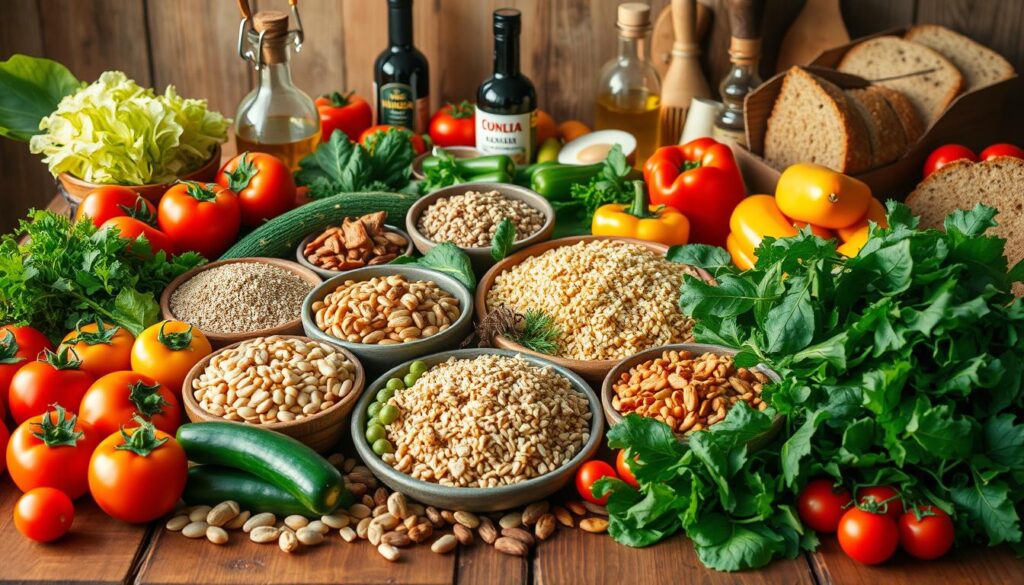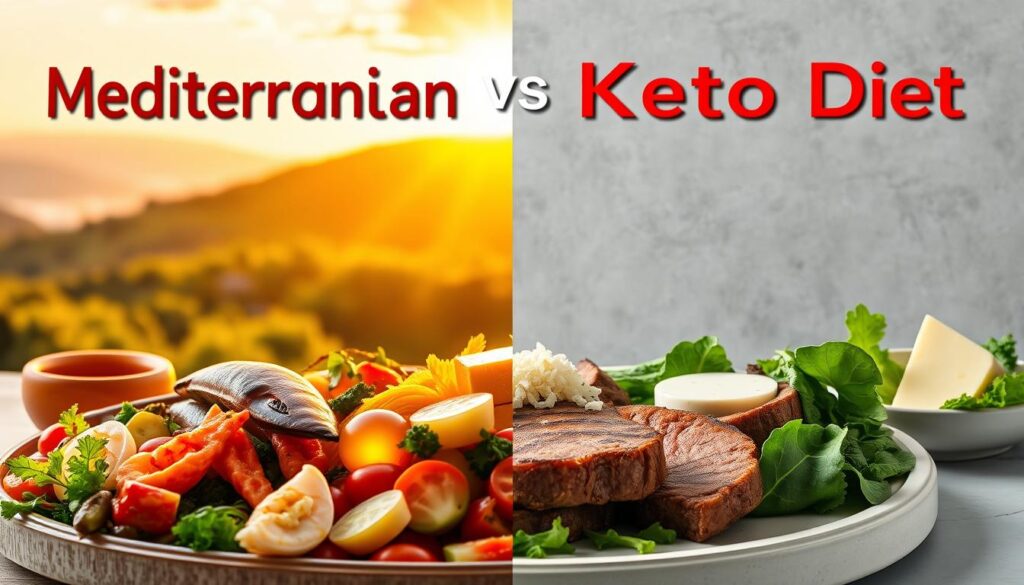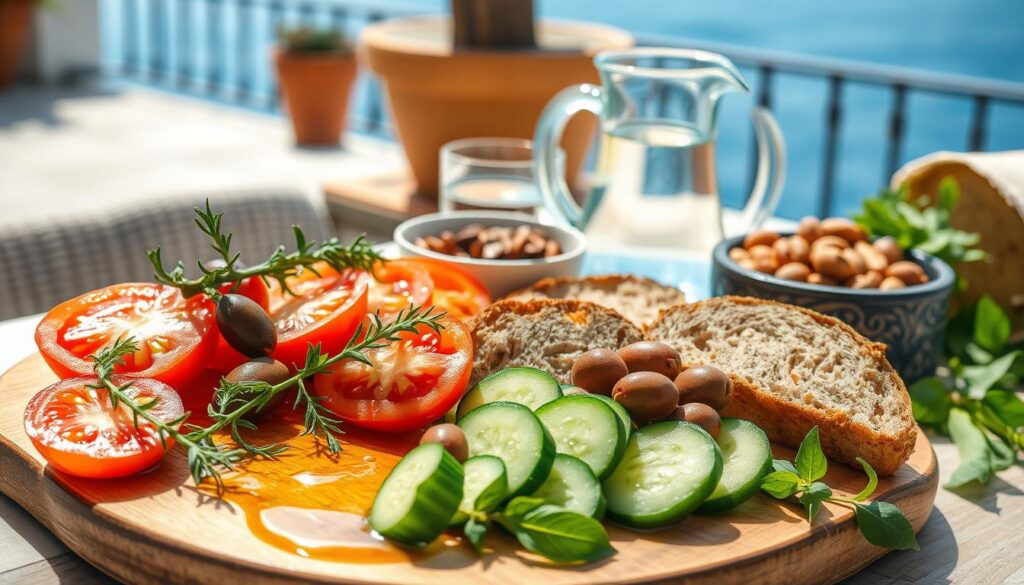The Mediterranean diet is loved worldwide for its health perks. It comes from the eating habits of places like Greece, Spain, and Italy. It’s not just a diet; it’s a way of life that focuses on overall wellness.
Origins and Cultural Roots
The Mediterranean diet started with the traditional foods of the Mediterranean area. It’s all about eating whole foods and fresh ingredients. You’ll eat lots of fruits, veggies, whole grains, legumes, and healthy fats like olive oil.
But, it limits red meat and processed foods. This diet fits well with the Mediterranean lifestyle. It includes regular exercise and eating with others.
Core Principles of the Diet
For those new to the mediterranean diet for beginners, it’s key to know the basics. It focuses on plant-based foods, lean proteins, and olive oil as the main fat. Whole grains, nuts, seeds, and legumes are the base.
Fruits and veggies are the stars. It also includes some fish and poultry, with red meat being rare. But, it limits processed foods and sweets. This lets the natural tastes of whole foods stand out.
The Mediterranean diet is a mix of healthy eating and enjoying food. It promotes a healthy, lasting lifestyle. By following it, you can lose weight, stay healthy, and improve your heart health. It truly captures the spirit of the Mediterranean diet.
Health Benefits of the Mediterranean Diet
The Mediterranean diet is loved for its tasty, heart-healthy meals and many health benefits. It helps people live longer and manage their weight better. It also lowers the risk of chronic diseases. Let’s see how it helps with weight loss, heart health, and fights inflammation.
Supports Weight Loss Naturally
- Numerous individuals opt for the Mediterranean diet to aid in weight management. It emphasizes whole foods such as fruits, vegetables, legumes, and whole grains. These options are low in calories yet rich in essential nutrients. Additionally, healthy fats from olive oil and nuts contribute to satiety, making adherence to the diet more manageable. read more Microbiome balance impacts overall wellness
Promotes Heart Health and Reduces Risk of Disease
The Mediterranean diet is great for your heart. Studies show it can lower the risk of heart disease by up to 30%. It includes healthy fats from olive oil and fatty fish. It also has lots of fiber from fruits, veggies, and whole grains, which is good for your heart.
The New England Journal of Medicine published a study indicating that individuals following a Mediterranean diet reduced their risk of heart disease by approximately 30%.
Anti-Inflammatory and Longevity Effects
The diet also has anti-inflammatory effects. It has lots of antioxidants from colorful fruits and veggies. This helps fight inflammation, which can prevent diseases like heart disease, diabetes, and Alzheimer’s. People who follow this diet often live longer and healthier lives.
This diet is full of nutrient-dense foods and lifestyle changes. It supports a healthy lifestyle and helps you live longer.
Mediterranean Diet Food List: What to Eat and What to Avoid
Starting the Mediterranean diet means knowing which foods are key and which to limit. It focuses on whole, healthy foods that are good for your heart and help you live longer. Plus, it offers a variety of tasty meals.
Foods to Eat Daily
Make sure your mediterranean diet grocery list includes these foods:
- Vegetables: Tomatoes, broccoli, spinach, and zucchini
- Fruits: Apples, oranges, grapes, and pomegranates
- Whole Grains: Quinoa, barley, whole wheat bread, and oats
- Lean Proteins: Fish such as salmon and tuna, poultry like chicken and turkey
- Healthy Fats: Olive oil, nuts, and seeds
- Dairy: Low-fat options such as Greek yogurt and skim milk

Foods to Limit or Avoid
For the best heart health, cut down on these foods:
- Processed Foods: Snack chips, frozen dinners, and sugary cereals
- Red Meats: Beef, pork, and lamb should be consumed sparingly
- Sweets: Limit intake of pastries, ice cream, and sugary beverages
- High-Sodium Items: Pre-packaged and fast foods often contain excessive salt
Sample Daily Meal Plan
Here’s a simple meal plan to start your Mediterranean diet journey:
- Breakfast: Greek yogurt with honey, nuts, and fresh berries
- Lunch: Quinoa salad with cherry tomatoes, cucumbers, olives, and olive oil
- Dinner: Grilled salmon with steamed broccoli and whole grain barley
- Snack: A handful of almonds or an apple with low-fat cheese
Eating these Mediterranean diet foods helps you stay balanced and enjoy healthy meals. It’s great for your overall health and heart well-being.
How the Mediterranean Diet Compares to Other Diets
The Mediterranean diet is known for its flexibility and variety. It’s different from strict diets like Keto and Paleo. Let’s see how these diets compare.

vs. Keto Diet
The mediterranean diet vs keto shows big differences. The Keto diet is all about eating lots of fat and very few carbs. This helps your body burn fat for energy.
The Mediterranean diet, on the other hand, balances fats, proteins, and carbs. This makes it easier to stick to for a long time. It helps you lose weight in a way that’s easy to keep up.
vs. Paleo Diet
The Paleo diet is based on foods from the Stone Age era. It cuts out dairy, legumes, and grains. The Mediterranean diet, though, lets you eat whole grains, legumes, and some dairy.
This makes the Mediterranean diet more flexible and less strict. It’s a better guide for a mediterranean nutrition plan that’s easier to follow.
vs. DASH Diet
The Mediterranean and DASH diets both promote eating fruits, veggies, and whole grains. But they differ slightly. The Mediterranean diet includes more healthy fats from olive oil.
The DASH diet, on the other hand, aims to lower sodium to control blood pressure. Both diets are good for your heart. But the Mediterranean diet’s focus on enjoying food makes it more appealing for a lasting lifestyle change.
Getting Started: A Beginner’s Guide to Transitioning
Starting the Mediterranean diet might seem hard, but it can be easy and fun. This guide will help you make good choices and live a healthier lifestyle.

Smart Grocery Shopping Tips
Good grocery shopping is key to starting the Mediterranean diet. Make a list of fresh produce like tomatoes and cucumbers. Choose lean proteins like fish and poultry. Use whole grains and extra virgin olive oil for fats.
Avoid processed foods and sugary snacks. Stick to the store’s perimeter to find healthier options.
Budget-Friendly Mediterranean Staples
Starting the Mediterranean diet doesn’t have to cost a lot. Buy beans, lentils, and whole-grain pasta. Canned tomatoes and chickpeas are great for many recipes. Nuts and seeds are good for snacks and adding nutrition.
Planning Your First Week of Meals
Having a meal plan is important for a smooth start. Begin with lots of vegetables and fruits. Include protein like salmon and chicken, and healthy fats like avocado.
Make sure to mix up your meals with different flavors and textures. This keeps your diet interesting and balanced.
- Monday: Greek salad with grilled chicken
- Tuesday: Baked salmon with quinoa and asparagus
- Wednesday: Chickpea and vegetable stew
- Thursday: Whole grain pasta with marinara sauce and sautéed spinach
- Friday: Mediterranean-style vegetable wrap with hummus
- Saturday: Grilled shrimp with brown rice and roasted vegetables
- Sunday: Lentil soup with a mixed green salad
This guide aims to make starting the Mediterranean diet easier. Success comes from being consistent and varied in your diet. Enjoy the benefits of this healthy lifestyle by planning well.
Common Myths and Misconceptions
The Mediterranean diet is often linked to olive oil and wine. But, there are many myths that need to be cleared up. This diet is about more than just a few foods. It’s about a whole way of eating and living.
Is It Just About Olive Oil and Wine
Many think the Mediterranean diet is all about olive oil and wine. But, that’s not true. It’s about eating a variety of foods like vegetables, fruits, and whole grains. It’s also about eating less processed food and more meals made at home.
Can You Lose Weight on This Diet
Some people think you can’t lose weight on the Mediterranean diet. But, many have found it helps them shed pounds. It’s because of the diet’s focus on fiber and healthy fats, which keep you feeling full.
By following mediterranean diet benefits and tips, you can lose weight and live healthier. It’s not just about losing weight. It’s about adopting a lifestyle that’s good for your health.
Expert Tips to Make the Diet Sustainable and Enjoyable
Adding the Mediterranean diet to your life can be fun and lasting. Here are some tips from experts to make it easy.
Eating Out the Mediterranean Way
Eating out can be tough on a diet, but not with the Mediterranean way. Choose meals with lots of veggies, whole grains, and healthy fats. Go for grilled veggies, whole grain salads, or fish in olive oil.
These options fit well with the mediterranean diet tips for lasting change. They let you enjoy your meals while sticking to your diet.
Involving Family in the Transition
Getting your family involved makes switching to a Mediterranean diet more fun. Plan and cook meals together. Try easy mediterranean recipes for beginners as a family.
This makes learning about new foods fun and educational. It also helps everyone eat healthier.
Building Long-Term Habits
For lasting weight loss, build habits that last. Cook meals ahead of time and choose whole foods over processed ones. Over time, picking healthy ingredients becomes second nature.
This approach makes the Mediterranean diet a lasting part of your life.
Frequently Asked Questions (FAQ)
If you’re new to the Mediterranean diet, you might have many questions. This section answers some common ones to help you start and stay on track.
What drinks are allowed on the Mediterranean diet?
The Mediterranean diet focuses on whole, natural foods. But drinks are important too. You can drink water, coffee, and tea with little sugar.
Moderate consumption of red wine is common. But if you don’t drink, you don’t have to start.
Can vegetarians follow it?
Yes, vegetarians can definitely follow the Mediterranean diet. It’s based on plants, making it easy for vegetarians.
Here’s a quick guide for vegetarians starting the Mediterranean diet:
- Focus on fruits, vegetables, whole grains, legumes, and nuts.
- If you’re a lacto-ovo vegetarian, include dairy and eggs.
- Use olive oil as your main fat source.
Vegetarians can make healthy, tasty meals with the Mediterranean diet’s flexible menu.
How soon will I see results?
Many people want to see results from the Mediterranean diet quickly. While results vary, some notice better energy and digestion in a few weeks.
For lasting benefits like weight loss and better health, sticking to it for months is key.
Also see: Intermittent Fasting vs Mediterranean Diet
Final Thoughts: Why the Mediterranean Diet Is More Than a Diet
The Mediterranean diet is more than just counting calories. It’s a way of life that combines healthy eating with exercise and socializing. This approach helps you enjoy food, build lasting habits, and move more every day.
For years, science has shown the Mediterranean diet’s benefits. It’s great for your heart, helps you live longer, and boosts overall health. It fights diseases like heart problems, diabetes, and some cancers. So, it’s not just about eating clean; it’s about living a healthy life.
The Mediterranean diet goes beyond regular dieting. It teaches you to love eating a variety of tasty foods. It helps you develop habits that keep you healthy for years. Whether you want to eat better for your heart or follow science-backed advice, this diet is a fun and lasting way to get healthy.
FAQ
What is the Mediterranean diet?
What are the core principles of the Mediterranean diet?
How does the Mediterranean diet support weight loss?
How does the Mediterranean diet improve heart health?
What anti-inflammatory and longevity effects does the Mediterranean diet have?
What foods should I eat daily on the Mediterranean diet?
What foods should I limit or avoid on the Mediterranean diet?
Can you provide a sample daily meal plan for the Mediterranean diet?
How does the Mediterranean diet compare to the Keto diet?
How does the Mediterranean diet compare to the Paleo diet?
How does the Mediterranean diet compare to the DASH diet?
What are some smart grocery shopping tips for starting the Mediterranean diet?
What are some budget-friendly Mediterranean diet staples?
How should I plan my first week of meals on the Mediterranean diet?
Plan meals with vegetables, nuts, and healthy fats. Aim for diversity and use fresh, whole foods. This keeps the diet interesting and balanced. Superfoods provide concentrated nutritional benefits






